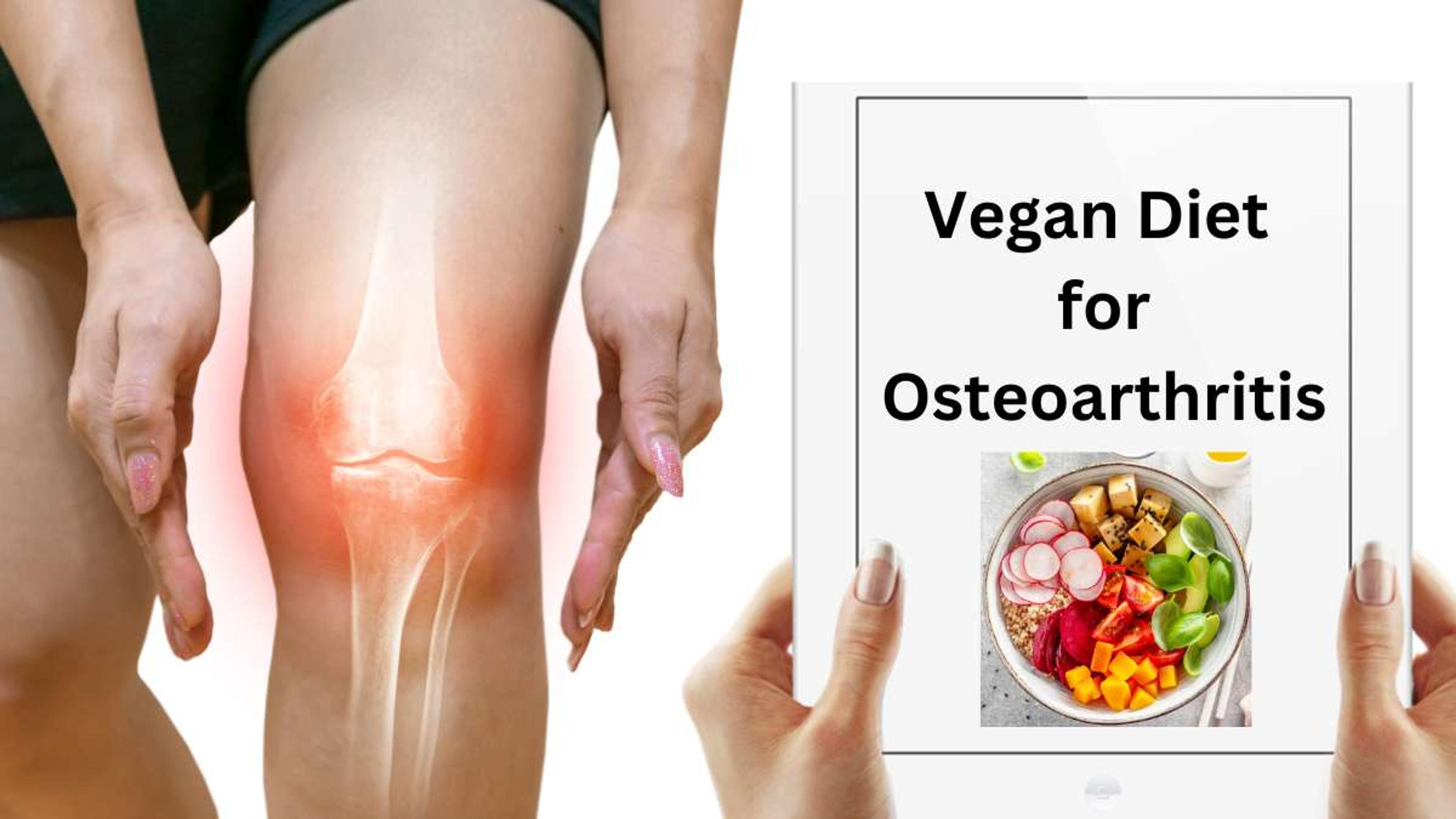Osteoarthritis Vegan Diet: A Comprehensive Guide

- Key Takeaways
- Understanding Osteoarthritis and the Impact of Diet
- Benefits of a Vegan Diet for Osteoarthritis
- Incorporating Vegan Foods into an Osteoarthritis Diet
- Tips for Implementing a Vegan Diet for Osteoarthritis
Severe joint pain from osteoarthritis can be a significant hindrance to living the life you love. Did you know that dietary changes, specifically adopting a vegan diet, may help alleviate some of these symptoms? This article will provide valuable insights into how plant-based foods can reduce inflammation and improve joint function.
Read on to discover the remarkable power of food in managing osteoarthritis!
Key Takeaways
- A vegan diet can help reduce inflammation, pain, and stiffness associated with osteoarthritis.
- Plant-based foods have anti-inflammatory properties that can improve joint function in individuals with osteoarthritis.
- Weight management is key in managing osteoarthritis symptoms, and a vegan diet can support healthy weight loss.
Understanding Osteoarthritis and the Impact of Diet

Osteoarthritis, the most common form of arthritis, occurs when the protective cartilage that cushions your joints wears down over time. A number of studies have shown osteoarthritis vegan diet in this disease process.
For instance, certain foods are known to reduce inflammation and joint pain associated with osteoarthritis. Rheumatology specialists often recommend incorporating these foods into a balanced diet to manage symptoms and improve overall joint health.
Contrary to popular belief, there's no convincing evidence that dietary changes can prevent joint damage in rheumatoid arthritis. However, adopting a vegan diet has been found to enhance joint function and decrease stiffness and pain for those suffering from osteoarthritis.
The anti-inflammatory properties of plant-based foods are largely credited with these improvements.
Weight management is another factor heavily influenced by diet which directly impacts osteoarthritis symptoms. Excess weight adds extra stress on weight-bearing joints like knees and hips making them more vulnerable to wear and tear leading to osteoarthritis over time.
Dietary modifications aimed at achieving healthy weight can thus be instrumental in managing this condition effectively.
Importantly, previous studies have shown that it's not just about what you eat but also what you avoid eating for an optimal diet plan against osteoarthritis. Certain trigger foods may exacerbate the symptoms of this condition necessitating their elimination from your daily meals for best results.
Benefits of a Vegan Diet for Osteoarthritis
A vegan diet, including a vegetarian diet, can provide several benefits for individuals with osteoarthritis, including reduced inflammation, decreased pain and stiffness, improved joint function, and access to anti-inflammatory properties found in plant-based foods.

Reduced inflammation
Switching to a vegan diet, even for a short vegan phase, has been shown to significantly reduce inflammation. Lower levels of arachidonic acid, which can be achieved by eating more plant-based foods and less animal products, result in decreased inflammation in sufferers of rheumatoid arthritis.
This is even noted with a drastic reduction in pain for patients by up to 53 percent.
A well-balanced vegan diet brimming with phytochemical-rich fruits, vegetables, whole grains, and legumes not only reduces gut inflammation but also ups the body’s immune system response.
Simultaneously, weight loss resulting from lower calorie intake on a low-fat vegan diet contributes significantly towards reducing joint stress. Joint health improves further as nutrient-dense veggies offer an abundance of vitamins C and D and calcium critical for bone strength.
Benefits extend beyond just reduced swelling; such dietary changes render significant improvements in overall wellness.
Decreased pain and stiffness
Adopting a vegan diet can lead to noticeable reductions in pain and stiffness associated with osteoarthritis. The elimination of animal products from the diet lessens exposure to arachidonic acid, an inflammatory compound that aggravates arthritis symptoms.
Findings suggest a 53% reduction in pain and inflammation levels after switching to plant-based foods. By choosing nutrient-dense fruits, vegetables, whole grains and legumes over meat and dairy, individuals suffering from arthritis often experience less joint discomfort and greater mobility.
Therefore, a well-planned vegan diet could be a game-changer for those aiming for relief from arthritic pain and stiffness.
Improved joint function
A vegan diet has been found to improve joint function in individuals with osteoarthritis. Studies have shown that following a whole-foods, plant-based diet can decrease stiffness, relieve pain, and enhance physical function in people suffering from hip or knee osteoarthritis.
By eliminating animal products and focusing on nutrient-rich plant foods, such as fruits, vegetables, legumes, and whole grains, individuals may experience significant improvements in their joint health.
This is due to the anti-inflammatory properties of plant-based foods and the reduction of weight on the joints that come with maintaining a healthy body weight through a vegan diet.
Anti-inflammatory Properties of Plant-Based Foods
Plant-based foods have been found to possess anti-inflammatory properties, making them a valuable addition to the diet of individuals with osteoarthritis. Research has shown that consuming plant-based foods can help reduce inflammation in the body, which is a common cause of pain and stiffness associated with arthritis.
These foods are rich in phytochemicals, which have been found to have anti-inflammatory effects. By incorporating more fruits, vegetables, whole grains, legumes, and nuts into their diet, individuals with osteoarthritis may experience relief from joint discomfort and improved joint function.
Weight Management and Joint Stress Reduction
A plant-based diet can aid in weight management and reduce stress on the joints for individuals with osteoarthritis. By consuming nutrient-rich, low-calorie plant foods, it is easier to maintain a healthy weight, which reduces the load on the joints.
This can help alleviate symptoms such as joint pain and stiffness. Additionally, plant-based diets are typically lower in saturated fats compared to animal-based diets, which may further contribute to weight loss and improve overall joint health.
Incorporating exercise into a plant-based lifestyle can also support weight management efforts while strengthening muscles around the joints for added support.
Nutrient-Rich Options for Joint Health
A vegan diet offers many nutrient-rich options for joint health. By including a variety of fruits and vegetables, whole grains, nuts, and beans in your meals, you can provide your body with essential vitamins and minerals that support joint health.
These foods are packed with antioxidants, which help reduce inflammation and protect against damage to the joints. Additionally, they contain nutrients like calcium, vitamin D, omega-3 fatty acids, and phytochemicals that promote strong bones and cartilage.
Adding these nutrient-rich options to your diet may help alleviate symptoms of arthritis and improve overall joint function.
Incorporating Vegan Foods into an Osteoarthritis Diet
Include plant-based sources of vitamin D and calcium, such as fortified plant milks or leafy greens, to support joint health. Try incorporating omega-3 fatty acids from flaxseeds or chia seeds for their anti-inflammatory properties.
Explore a variety of antioxidant-rich fruits and vegetables for added joint support.
Read more about the benefits of a vegan diet for osteoarthritis in our blog post!

Plant-Based Sources of Vitamin D and Calcium
Plant-based sources of vitamin D and calcium include:
- Fortified plant-based milk, such as almond or soy milk
- Leafy green vegetables like kale, collard greens, and spinach
- Tofu made with calcium sulfate
- Chia seeds and flaxseeds
- Almonds and sesame seeds
Plant-Based Protein Sources
A vegan diet can provide ample protein for individuals with osteoarthritis. Incorporating these plant-based protein sources into your meals can help support joint health:
- Legumes: Beans, lentils, and chickpeas are all excellent sources of protein. They are also rich in fiber, which can aid in weight management and reduce inflammation.
- Tofu and tempeh: These soy-based products are versatile and can be used in a variety of dishes. They provide a good amount of protein while also being low in saturated fat.
- Quinoa: This ancient grain is a complete protein, meaning it contains all nine essential amino acids. It is also high in fiber and other nutrients beneficial for joint health.
- Nuts and seeds: Almonds, walnuts, chia seeds, and flaxseeds are all great sources of plant-based protein. They also contain healthy fats that can help reduce inflammation.
- Seitan: Made from wheat gluten, seitan is a high-protein meat substitute. It has a chewy texture that makes it a popular choice for vegan dishes.
Omega-3 fatty acids, essential for arthritis pain relief, can be obtained from various plant-based sources, including:
- Vegetable oils (such as flaxseed oil and soybean oil)
- Nuts (especially walnuts)
- Flax seeds and chia seeds
- Leafy vegetables
Antioxidant-Rich Fruits and Vegetables
Antioxidant-rich fruits and vegetables play a crucial role in managing osteoarthritis and rheumatoid arthritis. These plant-based foods help to reduce inflammation and oxidative stress, providing relief from symptoms. Here are some examples of antioxidant-rich fruits and vegetables:
- Blueberries: Loaded with antioxidants like anthocyanins, blueberries have been shown to decrease inflammation and improve joint function.
- Raspberries: Rich in vitamin C and other antioxidants, raspberries have anti-inflammatory properties that can benefit those with arthritis.
- Strawberries: Packed with antioxidants like quercetin, strawberries can help reduce pain and stiffness associated with osteoarthritis.
- Pomegranates: Studies have found that pomegranate extract may help reduce inflammation and slow down the progression of osteoarthritis.
Tips for Implementing a Vegan Diet for Osteoarthritis
To successfully implement a vegan diet for osteoarthritis, start by gradually transitioning to plant-based foods and incorporating a variety of fruits, vegetables, whole grains, legumes, and nuts into your meals.
Plan balanced and nutritious meals that provide adequate protein from plant sources such as tofu, lentils, and quinoa. Also, prioritize foods rich in omega-3 fatty acids like flaxseeds and chia seeds for their anti-inflammatory properties.
Additionally, consider consulting with a registered dietitian who specializes in plant-based diets to ensure you are meeting all your nutritional needs while managing your osteoarthritis.

Tips for transitioning to a vegan diet
Transitioning to a vegan diet can be a positive step towards managing osteoarthritis. Here are some tips to help make the transition easier:
- Start with small changes: Begin by incorporating more plant-based foods into your meals and gradually reducing animal products.
- Experiment with new recipes: Explore different vegan recipes to find ones that you enjoy. This will make the transition more exciting and enjoyable.
- Plan your meals ahead of time: Create a meal plan that includes a variety of plant-based foods to ensure you're getting all the necessary nutrients.
- Find vegan alternatives: Look for vegan versions of your favorite foods, such as dairy-free milk or meat substitutes, to help satisfy any cravings.
- Educate yourself about nutrition: Learn about the essential nutrients that may be found in animal products and find plant-based sources for those nutrients.
- Seek support: Join online communities or local groups where you can connect with others who have also made the switch to a vegan diet.
- Be patient with yourself: Remember that transitioning to a new dietary lifestyle takes time and it's okay to make mistakes along the way.
Creating a balanced and nutritious meal plan
To create a balanced and nutritious meal plan for osteoarthritis, consider incorporating the following foods:
- Fruits: Include a variety of fruits, such as berries, oranges, apples, and bananas. They are rich in antioxidants and vitamins that can help reduce inflammation.
- Vegetables: Opt for colorful vegetables like leafy greens, broccoli, carrots, and bell peppers. These provide essential nutrients and phytochemicals that support joint health.
- Whole grains: Choose whole grain options like quinoa, brown rice, barley, and whole wheat bread. They are high in fiber and can help regulate weight and blood sugar levels.
- Legumes: Incorporate legumes such as lentils, chickpeas, black beans, and tofu into your meals. They offer plant-based protein which helps with muscle strength.
- Nuts and seeds: Snack on almonds, walnuts or include chia seeds or flaxseed in your meals to get a good source of healthy fats like omega-3 fatty acids.
- Plant-based protein sources: Include plant-based proteins like tempeh, edamame or seitan for adequate protein intake.
Incorporating exercise and other lifestyle changes for optimal results
Regular physical activity is essential for managing osteoarthritis symptoms and improving overall health. Here are some lifestyle changes you can make to optimize the benefits of a vegan diet for osteoarthritis:
- Engage in moderate-intensity aerobic exercises, such as walking, swimming, or cycling, for at least 150 minutes per week.
- Include strength training exercises that target the muscles around your joints to improve stability and support.
- Practice flexibility exercises like yoga or tai chi to enhance joint mobility and reduce stiffness.
- Maintain a healthy body weight through a combination of a vegan diet and regular exercise to alleviate stress on your joints.
- Avoid smoking, as it can worsen inflammation and hinder the effectiveness of dietary changes.
- Manage stress levels through relaxation techniques like deep breathing, meditation, or mindfulness exercises.
Conclusion
In conclusion, a vegan diet shows promising benefits for individuals with osteoarthritis, including reduced inflammation, decreased pain and stiffness, improved joint function, and weight management.
Plant-based foods are known to have anti-inflammatory properties and can aid in weight management, reducing stress on the joints. While more research is needed on this specific topic, adopting a vegan diet may be worth considering for individuals with osteoarthritis seeking natural ways to manage their symptoms.
FAQs
1. Can a vegan diet help with managing osteoarthritis?
A vegan diet can be beneficial for managing osteoarthritis as it focuses on whole plant-based foods that are rich in anti-inflammatory properties. This can help reduce inflammation and pain associated with the condition.
2. What types of foods should I include in a vegan diet for osteoarthritis?
In a vegan diet for osteoarthritis, you should include plenty of fruits, vegetables, whole grains, nuts, seeds, legumes, and plant-based proteins such as tofu or tempeh. These foods provide essential nutrients like antioxidants and omega-3 fatty acids that can support joint health.
3. Should I take any supplements while following a vegan diet for osteoarthritis?
It is recommended to consult with a healthcare professional or registered dietitian before starting any supplements. Some common supplements that may be beneficial for individuals on a vegan diet for osteoarthritis include vitamin B12, vitamin D, calcium, and omega-3 fatty acids.
4. Are there any potential challenges or considerations when following a vegan diet for osteoarthritis?
One challenge of following a vegan diet for osteoarthritis is ensuring adequate intake of certain nutrients like protein and calcium. It's important to plan meals carefully to meet your nutritional needs and consider incorporating fortified plant-based sources or discussing supplementation options with a healthcare professional.

